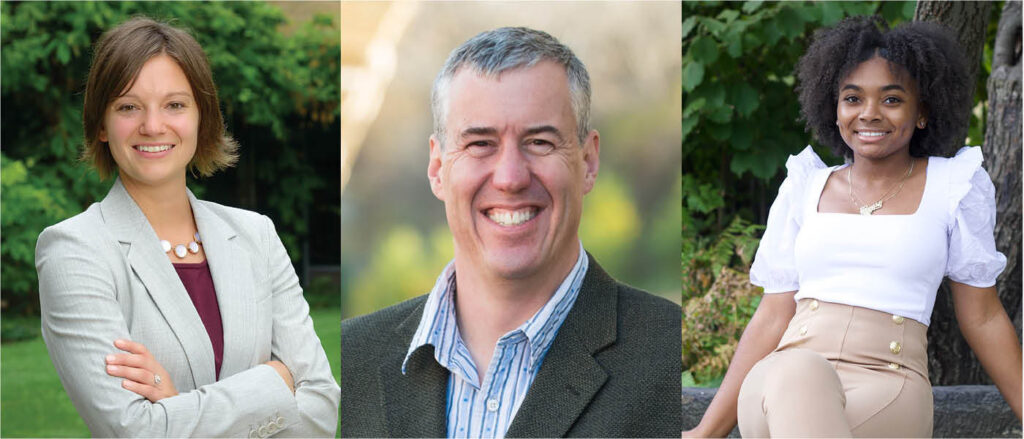
More than half a century ago, the Higher Education Act (HEA) of 1965 was signed into law to help level the playing field for students from low-income and minority backgrounds. Its anniversary (Nov. 8) is marked by the First-Generation College Celebration, a nationwide event recognizing how HEA-initiated federal grants and loan programs have paved the way for people to become the first in their families to attend college.
Today, first-gen students can be found on campuses across the country—and Case Western Reserve University’s is no exception. Their experiences are championed through organizations such as First CWRU—formed in 2018 to help offer guidance for new students navigating the college experience—and have been highlighted in past issues of Think magazine.
Many Case Western Reserve staff, faculty and administrators were also the first in their families to pursue higher education. The Daily sat down with three members of the university community to hear their firsthand insights and advice for today’s first-gen students.
Laura Voith, associate professor
As a faculty member at the Jack, Joseph and Morton Mandel School of Applied Social Sciences, Laura Voith focuses on the prevention and intervention of violence against women and youth through counseling, agency- and community-based coordination efforts and research. Specifically, she works with boys and men to uncover the etiology of violence through the lens of trauma and health disparities. Voith earned her PhD, Master of Social Work, and Bachelor of Arts from the University of Wisconsin, Milwaukee.
What inspired you to pursue a college education?
Voith: I have always been intellectually curious and goal-oriented, and so I used school as an outlet to apply myself. My mom worked hard to send me and my siblings to the best schools we could afford while we were kids. The high school I went to was filled with teachers, administrative staff, and coaches who saw my potential and encouraged this pathway for me.
What was the biggest challenge you encountered as a first-gen student and how did you overcome it?
Voith: I paid my way through college by maintaining four jobs while completing coursework. People described me as “scrappy” and tenacious, which served me well; however, there were points of significant stress when things were very tight financially. I’m thankful for lost-cost food (like ramen noodles) and “shift meals” while waitressing that got me through those times.
Why do you feel it’s important to pursue college even if your family members have not?
Voith: A professor in my freshman-year seminar said “you should go to college to become a cooler person.” I took that to mean, one of the most important reasons to go to college is to broaden your mind, expand your interests, experience people and cultures different from your own, develop new skills, and think deeply about radically new ideas. Pursuing these things will take you places (literally and metaphorically) your family has never been, which can be hard sometimes—though, I am grateful for the person I have become as a result of this approach.
What advice would you give today’s first-gen students?
Voith: College is both an awesome and strange place. There are scripts, norms, and customs that are unspoken, yet guide the inner working of higher education. It can be an intimidating place—so form relationships with your professors, explore and utilize all of the resources on campus, and get engaged with extra-curriculars so that you can have allies to help you navigate academia. Remember that you deserve to be here just as much as anybody else and use this time to explore new things and meet new people—you won’t regret it.
Michael Oakes, senior vice president for research and technology management
A renowned social epidemiologist and research leader, Michael Oakes joined Case Western Reserve University in July of this year to lead the university’s efforts in research and commercialization. Oakes began his collegiate career as a student at a community college before attending the University of Massachusetts at Amherst on a scholarship to earn his Bachelor of Science in Management Economics with a focus on organizational theory.
What inspired you to pursue a college education?
Oakes: I was torn between a career in the trades or going to college, as if they were mutually exclusive. I decided to try college because it seemed to give me a better chance to make a difference and to scratch my intellectual interests.
What was the biggest challenge you encountered as a first-gen student and how did you overcome it?
Oakes: There is no “biggest” challenge: I had little information, no money, and negative social support, yet each is vital to success. It wasn’t easy overcoming the trifecta, but I paid attention to what successful people were doing (not saying), worked night and day doing dishes and cleaning floors, and rejected the nay-sayers.
Why do you feel it’s important to pursue college even if your family members have not?
Oakes: I’m not sure it is. I have great admiration for trade- and crafts-people, as well as those in the armed forces, who create and protect our community. A college education was great for me because I am deeply curious and formal training was helpful to my intellectual growth and ability to have a positive impact. I feel very lucky to have been given opportunities to succeed by some very kind people.
What advice would you give today’s first-gen students?
Oakes: Accept that you need to work harder and be vastly more self-disciplined than others. Choose your role models very carefully and ask for opportunities to prove yourself. Never quit.
Asia Fields, third-year undergraduate student
A New York native, Asia Fields came to Case Western Reserve University to pursue majors in nutritional biochemistry and metabolism with minors in Spanish, chemistry and business management. She serves as the treasurer of The Sisterhood at CWRU, an organization designed to promote community support, empowerment and outreach within the Black female-identifying community. After graduation, Fields intends to work toward becoming a bilingual physician.
What inspired you to pursue a college education?
Fields: Since a child, I have always aspired to be a doctor, and at the time, I learned that it was necessary to obtain a college education to become one. Even though neither of my parents hold a college degree, they have always supported me in the best way they could throughout my academic career.
What was the biggest challenge you encountered as a first-gen student and how did you overcome it?
Fields: My biggest challenge as a first-generation student was not being able to ask my parents about their experience navigating an academic system at a top university. I overcame this through trial and error, trying to understand how I learned best and what study methods worked for me.
Why do you feel it’s important to pursue college even if your family members have not?
Fields: It is crucial to pursue a college education to advance my family and myself.
What advice would you give today’s first-gen students? Fields: It will not always be easy, and you may not always get it the first time around, but keep moving forward.


